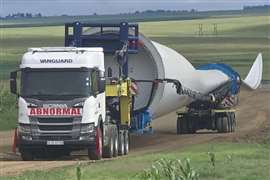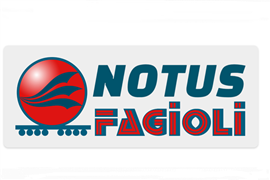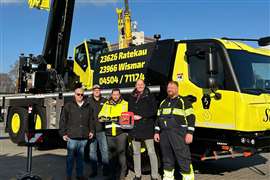Read this article in French German Italian Portuguese Spanish
Interview: Why Sarens has big hopes for rental
04 June 2024
Sarens is aiming to increase its share of the rental market significantly over the next five years. Lewis Tyler finds out the role new revenue streams, depot openings and fleet expansion will play.
 Group rental sales director Masroor Saeed Malik. (Photo: Sarens)
Group rental sales director Masroor Saeed Malik. (Photo: Sarens)
According to the IC100 ranking of the largest crane-owning companies in the world, (published by IRN’s sister publication International Cranes and Specialized Transport), heavy lift and transport specialist Sarens ranks second.
On the rental side of the business, the company generated rental revenues of €651 million in 2022, up from €575 million in 2021, placing it in the top 25 globally.
More growth in rental is planned for the Belgium-headquartered company, noting a growing demand for services in the sector.
Masroor Saeed Malik, group rental sales director, attributes this growth to markets becoming industrially mature, increasing the prominence of rental services.
Speaking to IRN earlier this year, Malik said, “The markets, especially in the developing world where there are still refineries that are being built, there are still nuclear plants being built, it is more project-oriented markets.
“But if you look forward towards the Eastern Europe, Western Europe, and American markets, they are becoming more mature and there are more and better opportunities for rental.”
The long-term aim for the company is to capitalize on the favorable environment in these countries, supported by strong demand.
“Let’s say our market share is on average about 5%, the growth possibility in the rental business is that we can at least double it up from 5% to 10% market share in the markets where we are aggressively marketing ourselves in rental,” says Malik.
“We can drive growth in the rental business, subjective and relative to investment and many things, but we are in control of growing and sustaining that growth in the rental market, whereas in project it is mostly driven by the external environment.”
Currently, the revenue split between its rental side and projects is roughly 60/40, but this could shift with increased demand for rental services, fleet investment and geographical expansion likely to influence growth.
New revenue streams in rental
The company, which has 100 rental depots worldwide, recently found new revenue streams in the rental sector with its light equipment offering, branded as Crane Plus.
Launched last year, the segment includes forklifts, telehandlers, and lifting gear, contributing 7% to 8% of revenues in 2023.
Malik, who has been with Sarens for 22 years, says that the company aims to expand this segment further to become a “one-stop shop” for customers’ load and transport requirements via rental.
He says the creation of this offering comes largely from customer requirements; “Everybody wants an expert who can handle from one point to another point. It’s a total delivery. Today customers would like to outsource as much as they can at reasonable cost.
“I’ll put it like that because Sarens takes pride that we are not the cheapest in the market. Our customers who deal with us, they understand that we bring international quality, we bring the international standards and are very particular about health and environment issues.
“What happens when you get into a project environment, one of the initial requirements is for this light equipment when some of the first materials start arriving at a construction site or in warehouse, and they are generally the last ones to leave.
“The idea behind this is how do you connect with a customer at the very first stage of their movement on site, and how do you provide them a single window provision? Not only cranes or heavy lifting gear, but all aspects of light equipment.”
The company certainly has bold plans for Crane Plus, with Sarens aiming to get somewhere between 10% to 15% growth in some markets.
“If you see globally, it will be somewhere about 5% to 7% against our global revenue targets. That’s what we want to achieve. 2023 and 2024 will be inception years for us and then we take a major call in ‘25.”
In terms of its fleet investment overall, Sarens invested €80 million in rental machines in 2023, up 8% from the previous year.
The company aims to grow this by 10% per annum for the next five years, with its fleet utilisation currently somewhere in the range of 80% to 90%, which Malik says is one of the highest in the rental environment.
“This is a regular growth plan which will happen by fleet size, by price increase, which we are pushing for, and then by taking on opportunities in growing markets as well as venturing into new markets,” he says.
Rental depot expansion
 Sarens Giant Crane, Little Celeste, replaces two enormous century-old rail bridge sections In Massy, France.
Sarens Giant Crane, Little Celeste, replaces two enormous century-old rail bridge sections In Massy, France.
Alongside the plans to expand via product offerings such as Crane Plus as well as capex on fleet, the company has also unveiled an aggressive plan for depot expansion in existing territories.
Malik tells IRN that the implementation of this new depot model will enable the company to become closer to a larger customer base in numerous territories.
This, he says, will help to reduce turnaround times and costs, enabling Sarens to provide services efficiently and paving the way for deeper market penetration and an expanded service portfolio.
“We have taken another drive we call depot setup. It is the idea about going deeper into each regional and country market,” he says.
“When we arrived in a country, we arrived on the back of a project, then we established ourselves. What was happening was that we were basically operational from a particular hub in a particular geography.
“As we are maturing in that aspect of our business now, we started getting deeper within a country. We started getting into the other markets or other industrial pockets of that country and trying to act like a local organization.”
He uses Eastern Europe as an example, where the company has bases in Poland and Belarus. The growth plan for that region has seen it expand into Slovakia as well as planned investment in Germany.
Another example is Algeria, where the company has been operational for around 11 years. When a crane was mobilized for use from Algeria, it had to be transported up to 2,000km in some cases.
Now, with the new depot model in place and a more mature market with four depots, the company is able to provide a more localized approach to services.
“Every country business unit has been given responsibility that they need to look into two aspects,” he says.
“One, to grow into the country market instead of being centrally working from one main office or one regional or country office. But going into the deeper pockets, industrial pockets which will also make us local.
“That’s a very successful venture. We have on average three depots in every country. We are looking somewhere between 160 to 180 depots besides our main offices. That gives us a very detailed and long-lasting marketplace.”
He says the company is implementing this model everywhere, with Sarens now “open to the world” in terms of expansion (at the time of writing it is currently operational in 65 countries).
“After the Covid era, the world economy is in a much more stable and balanced state. That is giving us a long-term perspective, we are looking for different things that are happening in different markets in the world from Australia to Canada.
“In Australia we are going to New Caledonia. We are also venturing into Papua New Guinea but I won’t divulge more than that. We are trying to look into every market which is politically and economically viable.”
Sarens and sustainability
The company is involved in a number of sustainability initiatives, including the Sarens Sustainability Accelerator, which it launched last year.
Of course, it was also responsible for the world’s first giant green crane, the SGC-90, and is investing in fleet that is either hybrid or equipped with engines compliant with the latest emissions standards.
Regarding electric units, although Malik says that although the technology is still to be proven, the company is taking the energy transition “very seriously.”
He says, “We understand that there will be a time that any customer would like to be green. So we are, as an organization, consciously taking an effort towards that. It’s a part of being socially and environmentally conscious that we should.
“I should also say that it’s possible to lose clients in certain places, for instance, the Netherlands. It’s a requirement right now in tenders. It is a requirement, but what is driving it is our own conscious effort.”
He says the company has a strong ESG plan in place to accelerate the energy transition, which will not be lost on those deeply embedded in the rental industry.
STAY CONNECTED


Receive the information you need when you need it through our world-leading magazines, newsletters and daily briefings.
CONNECT WITH THE TEAM












